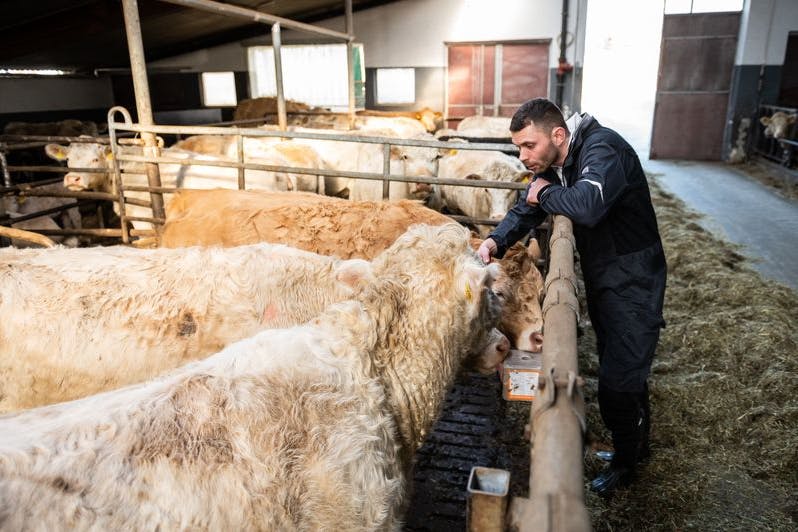| | | (Translated from German)
End without fear: slaughter in a gentler way, is that possible?
If eating meat, then associated with little animal suffering, right? Mobile, decentralized slaughter is intended to save animals the often long, fearful journeys.

Ratshausen: Maximilian Sauter stands in a stable with his cattle.dpa/Silas Stein
It does not know what is happening to him. The cattle on the farm in Ratshausen on the western edge of the Swabian Alb goes unsuspectingly and fearlessly to eat in the catch box, to which it has been accustomed before. It begins to eat, a metal bracket wraps around its neck as soon as the animal's head is far enough forward. The farmer Maximilian Sauter approaches, places a bolt gun on the animal's forehead and pulls the trigger.
Stunned, the animal collapses, is pulled in no time at all in the catch box on rails into a docked trailer, a roller door drives down. Then an incision is made in the resulting closed space, the animal bleeds out within seconds and dies. A death for the animal without pushing and crowding and without stressful and fearful transport to the slaughterhouse.
This is the concept of mobile slaughter units and that of "Schlachtung mit Achtung" (Slaughter with respect), which developed such a unit over the years and has been distributing it since March 2019 via the company MST Mobile-Schlachttechnik based in Kandern near Lörrach.
The way to the butcher is often excruciatingly long for the animals. Animal rights activists, butchers, organic farmers and state governments such as in Baden-Württemberg are campaigning for the slaughter of cattle and pigs close to the farm - and mobile slaughter units are suitable for this. Interest in it is increasing nationwide, says the Association of Farmers with Artisanal Meat Processing (VHLF). According to VHLF chairman Andrea Fink-Keßler, there are no statistics, but the number of mobile battle units is growing.
Within 90 minutes for further processingFarmer Ernst Hermann Maier from Balingen, who developed the Mobile Slaughter Box MSB in 1995, is regarded as a pioneer in this field. The Lüneburg company ISS Innovative Schlachtsysteme also sells mobile shaft trailers, another variant was developed in Hesse as part of the "Extrawurst" project; there are other German manufacturers.
Three mobile slaughter facilities of "Schlachtung mit Achtung" are located in Baden-Württemberg alone, reports Sandra Kopf, who was instrumental in driving the project forward. They cost between 70,000 and 110,000 euros, depending on the equipment. Normally, it takes four to six months to build them, says MST Managing Director Peter Brandmeier.

Farmer Maximilian SauterDpa
The municipality of Baiersbronn in the Black Forest has acquired one, as well as a butcher's shop in Dotternhausen in the Zollernalbkreis - it is the plant that stands on the farm of farmer Sauter. Whether the price for the slaughterhouse has already paid for itself, he and his boss Sven Balzer, with whom he bought the system, pretty much does not care. "We do this for ethical reasons."
Federal Minister of Agriculture Cem Özdemir (Greens) has also decided to expand the mobile slaughter of animals on farms. However, the collapse of regional artisanal slaughter structure stands in the way of further spread, says Fink-Kessler of the Association of Farmers with Artisanal Meat Processing.
Farmers depend on nearby slaughterhouses when they have to take the dead animal from their farm and within 90 minutes to a slaughterhouse for further processing.
Whether mobile slaughter without long transport is also suitable for large-scale industrial operations or entire regions is controversial. "Mobile slaughtering is a niche for a few farms, for example with year-round grazing or direct marketing," says Ariane Amstutz, spokeswoman for the state farmers' association in Baden-Württemberg. The population's demand for meat can never be met with this alternative. By far the most animals still have to be transported to the slaughterhouse.
MST Managing Director Peter Brandmeier, however, can hardly save himself from inquiries, as he says. He received inquiries from the USA or Israel. "The slaughter industry has its back to the wall and hasn't changed in the last 70 years," he says. A large meat processing company from North Rhine-Westphalia has also already looked at the plant. |
|






